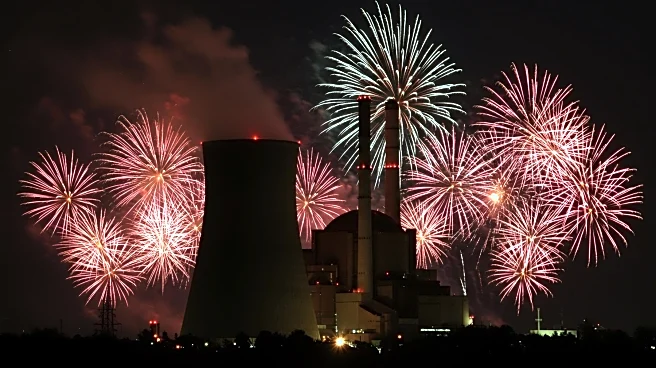What's Happening?
Russia has accused Ukraine of launching drone attacks that caused a fire at a nuclear power plant in the Kursk region, coinciding with Ukraine's Independence Day celebrations. The fire, which was quickly extinguished, reportedly damaged a transformer but did not result in any injuries or radiation leaks. The International Atomic Energy Agency acknowledged reports of the incident but has not independently confirmed the details. Ukraine has not commented on the allegations. The attack is part of a broader pattern of military engagements, with Russia claiming to have intercepted numerous Ukrainian drones. Meanwhile, Ukraine's President Volodymyr Zelensky emphasized the country's resilience and commitment to peace in a speech marking the 34th anniversary of Ukraine's independence from the Soviet Union.
Why It's Important?
The alleged attack on the nuclear facility underscores the ongoing tensions and military confrontations between Ukraine and Russia, highlighting the potential risks to nuclear safety in conflict zones. This incident could escalate international concerns about the security of nuclear sites in war-torn areas. The situation also reflects the broader geopolitical dynamics, with Ukraine seeking international support to bolster its defense capabilities. The involvement of global leaders, such as Canada's Prime Minister Mark Carney, who pledged significant military aid to Ukraine, indicates the international community's vested interest in the conflict. The developments could influence future diplomatic and military strategies in the region.
What's Next?
The international community, including organizations like the United Nations and the International Atomic Energy Agency, may increase scrutiny and calls for protective measures around nuclear facilities in conflict zones. Ukraine's continued push for international military support suggests further diplomatic engagements and potential military aid packages from allied nations. The situation may also prompt discussions on the role of international peacekeeping forces in Ukraine. Additionally, the ongoing military exchanges and prisoner swaps between Ukraine and Russia could continue as both sides seek to leverage their positions in the conflict.
Beyond the Headlines
The incident raises ethical and legal questions about the targeting of nuclear facilities during armed conflicts, potentially prompting international legal bodies to revisit protocols and agreements on the protection of such sites. The broader cultural and historical context of Ukraine's independence and its struggle for sovereignty against Russian influence remains a poignant backdrop to these developments, influencing national identity and international perceptions.








